Tall Ships Visit
As part of the Tall Ships visit to Sunderland, BCS will be performing on Thursday July 12th 2018 between 1.30 and 2.15 p.m. on the Town Moor.
More details will be provided later for those who are able to take part in this.
As part of the Tall Ships visit to Sunderland, BCS will be performing on Thursday July 12th 2018 between 1.30 and 2.15 p.m. on the Town Moor.
More details will be provided later for those who are able to take part in this.
As part of the preparation for our Anniversary concert, the Society will be hosting a Singing Day led by Aidan Oliver. Bishopwearmouth Choral Society was founded in 1948 and gave its first performance, Hayden’s Creation, in March 1949 in the then Bishopwearmouth Church. As part of our 70th Birthday celebrations we shall again perform Creation on Saturday March 30th 2019 at 7.30 p.m. in the same venue now known as Sunderland Minster.
As well as the Singing Day allowing us as members a preview of the work to be performed later in the year, we hope that it will attract singers from other choirs to see what Bishopwearmouth Choral Society is all about informally and through singing together.
Pre-booking is essential and the brochure with details about how to do that (and how attendees can apply for a special offer on tickets for the actual concert in March) can be found on this link BCS 70th Brochure
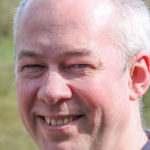 Aidan is a conductor and choir director who works widely across the full range of symphonic, operatic and church music. Recently appointed the new director of the Edinburgh Festival Chorus, he is also the director of Philharmonia Voices and Director of Music at the Parliamentary Church, St Margaret’s, Westminster Abbey.
Aidan is a conductor and choir director who works widely across the full range of symphonic, operatic and church music. Recently appointed the new director of the Edinburgh Festival Chorus, he is also the director of Philharmonia Voices and Director of Music at the Parliamentary Church, St Margaret’s, Westminster Abbey.
As guest chorus master Aidan Oliver has worked with choirs including the BBC Symphony Chorus, BBC Singers, Huddersfield Choral Society, the Chorus of English National Opera, and the RIAS Kammerchor of Berlin. He has directed the music at St Margaret’s Church, Westminster Abbey since 2003, overseeing many high-profile occasions including the memorial services of Lord Snowdon and Jo Cox MP. He has worked frequently as a guest on the music staff of the Royal Opera House and is the musical director of Dulwich Choral Society; since 2011 he has also been Associate Conductor of the St Endellion Summer Festival in Cornwall having first become involved there in 2004 at the invitation of Richard Hickox.
Philharmonia Voices was founded by Aidan in 2004 to provide the Philharmonia with an elite professional choir which has since collaborated with the orchestra on a huge range of projects. Working particularly closely with the Principal Conductor, Esa-Pekka Salonen, the choir has also worked frequently with conductors including Vladimir Ashkenazy, Christoph von Dohnányi, Jakub Hrůša, and John Wilson. Highlights for the choir in recent years have included the Philharmonia’s acclaimed 2016 series Stravinsky: Myths and Rituals, which won a South Bank Sky Arts Award; several appearances at the BBC Proms and European premières including Shostakovich’s rediscovered operatic fragment Orango.
Aidan will take up his position in Edinburgh in September 2018, while still living in London and pursuing an increasingly diverse conducting career.
It is hoped that singers from other groups will be able to join us in this opportunity.
Programme for the day :
Registration / Coffee 9.45 am onwards
First session 10.15-11.25 am.
Coffee.
Second session 11.45-12.45 pm.
Lunch.
Third session 1.45-2.50 pm.
Tea.
Final session 3.15- 4.15 pm. (including informal mini-performance of selected movements)
A Saturday evening concert in Sunderland Minster starting at 7.30 p.m., conducted by David Murray, featuring pieces by Barber, Bernstein and Copeland.
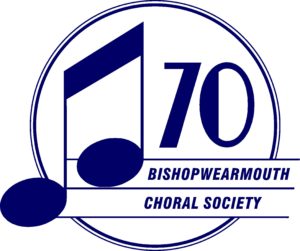 Tickets £14.00 for Nave (£8 concessions for full-time students and on income related benefits) or £8.00 (Gallery – limited view). Accompanied under 16s free. Tickets are available from members of the Society, at the door, or on-line from http://www.wegottickets.com/BCS – who also have a direct link via the Book Tickets tab of this website. Doors open from 6.45 p.m.
Tickets £14.00 for Nave (£8 concessions for full-time students and on income related benefits) or £8.00 (Gallery – limited view). Accompanied under 16s free. Tickets are available from members of the Society, at the door, or on-line from http://www.wegottickets.com/BCS – who also have a direct link via the Book Tickets tab of this website. Doors open from 6.45 p.m.
All tickets are numbered, for administrative purposes, but this does not indicate a reserved seat unless you are a Patron of the Society.
The content will include Adagio for Strings – Barber, Chichester Psalms – Bernstein, Stomp your feet & Chinga Ring Chaw – Copland, Symphonic Dances – Bernstein.
A Saturday evening concert in Sunderland Minster starting at 7.30 p.m., conducted by David Murray.
A Saturday evening concert in Sunderland Minster starting at 7.30 p.m., conducted by David Murray.
 This will be the Society’s 70th Anniversary concert and will replicate its first concert with a performance of Haydn’s ‘Creation’.
This will be the Society’s 70th Anniversary concert and will replicate its first concert with a performance of Haydn’s ‘Creation’.
Soloists : Laurie Ashworth – soprano, Jorge Navarro Colorado – tenor, and Timothy Dickinson – bass baritone.
Tickets £14.00 for Nave (£8 concessions for full-time students and on income related benefits) or £8.00 (Gallery – limited view). Accompanied under 16s free. Tickets are available from members of the Society, at the door, or on-line from http://www.wegottickets.com/BCS – who also have a direct link on the home page of this website. Doors open from 6.45 p.m.
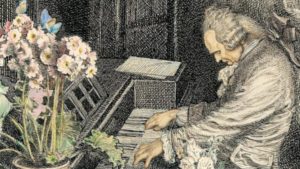 It was Haydn’s encounter with Handel’s oratorios in London that sowed the seeds of his most famous and enduring masterpiece:The Creation. At the 1791 Handel Festival in Westminster Abbey he was overwhelmed by the monumental sublimity of the choruses in Handel’s Messiah and Israel in Egypt, performed by a gargantuan array of over 1000 players and singers.
It was Haydn’s encounter with Handel’s oratorios in London that sowed the seeds of his most famous and enduring masterpiece:The Creation. At the 1791 Handel Festival in Westminster Abbey he was overwhelmed by the monumental sublimity of the choruses in Handel’s Messiah and Israel in Egypt, performed by a gargantuan array of over 1000 players and singers.
While still in London Haydn expressed a desire to compose a work on a similarly exalted biblical theme that would appeal to a broad public. For the time being nothing came of the idea, but just before he left England for the last time, in the summer of 1795, the impresario and violinist Johann Peter Salomon handed him an anonymous English libretto on the subject of The Creation which had allegedly been intended for Handel half a century earlier.
Haydn immediately saw the musical potential in The Creation text, whose main sources were the book of Genesis, Milton’s Paradise Lost (especially for the animal descriptions in Part Two, and the hymn and love duet in Part Three) and, for several of the choruses of praise, the book of Psalms.
Back in Vienna, the composer asked the Imperial Court Librarian, the formidable Baron Gottfried van Swieten, for his opinion. In Swieten’s own words, ‘I recognized at once that so elevated a subject would give Haydn the opportunity…to express the full power of his inexhaustible genius; I therefore encouraged him to take the work in hand….’ Swieten made a highly skilled job of translating and adapting the libretto,.
The structure of The Creation has an ideal simplicity and strength. The first of the oratorio’s three parts begins with “Representation of Chaos”, an orchestral prelude that uses stark chords and shifting harmonies to portray the formlessness and disorder that preceded the Creation. The six days of creation are each introduced in recitative by the archangels Raphael (bass), Uriel (tenor) and Gabriel (soprano). Each new creation – light, water, landscapes, plants, and beasts of land and sea and air – is depicted with lavish tone painting. The story of Adam and Eve begins in the third part, and focuses on the happy union between Adam and Eve, culminating in a tender marriage duet
The Creation received immediate acclaim when it was performed before a packed aristocratic audience in the Schwarzenberg Palace in Vienna, first at an open rehearsal on 29 April 1798 and then at its official premiere the following day. Haydn, who conducted, was as overwhelmed as his listeners.
Replying to a letter expressing admiration for The Creation, Haydn wrote in 1802 that ‘Often, when I was struggling with all kinds of obstacles… a secret voice whispered to me: “There are so few happy and contented people in this world; sorrow and grief follow them everywhere; perhaps your labour will become a source from which the careworn… will for a while derive peace and refreshment.”’ These words are typical of a devout, humble yet by no means naive man. Haydn’s hopes were richly fulfilled in his lifetime. In our own sceptical and precarious age we can still delight, perhaps with a touch of nostalgia, in Haydn’s unsullied optimism, expressed in some of the most lovable and life-affirming music ever composed.
The end result was the greatest triumph of Haydn’s career.
A Saturday evening concert in Sunderland Minster starting at 7.30 p.m., conducted by David Murray.
Tickets £14.00 for Nave (£8 concessions for full-time students and on income related benefits) or £8.00 (Gallery – limited view). Accompanied under 16s free. Tickets are available from members of the Society, at the door, or on-line from http://www.wegottickets.com/BCS – who also have a direct link on the home page of this website. Doors open from 6.45 p.m.
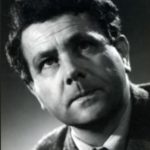 Gerald Finzi was born in London on July 14, 1901, and spent his early childhood in London. His father died when he was just seven and following the outbreak of the First World War Finzi moved with his mother to Harrogate, in Yorkshire. There Finzi was able to study composition with the composer Ernest Farrar and from 1917 with Edward Bairstow at York Minster. But attracted by the beauty of the English Countryside, Finzi moved to Painswick, Gloucestershire, in 1922 where he was able to compose in tranquility
Gerald Finzi was born in London on July 14, 1901, and spent his early childhood in London. His father died when he was just seven and following the outbreak of the First World War Finzi moved with his mother to Harrogate, in Yorkshire. There Finzi was able to study composition with the composer Ernest Farrar and from 1917 with Edward Bairstow at York Minster. But attracted by the beauty of the English Countryside, Finzi moved to Painswick, Gloucestershire, in 1922 where he was able to compose in tranquility
A series of tragedies profoundly affected Finzi in his early years. By the time he was eighteen he had lost his father, three elder brothers and his much-loved music teacher, killed in action. This dreadful sequence of events, and the appalling losses of the First World War that formed the backdrop to his adolescence, gave Finzi an acute awareness of the impermanence of life, confirmed with grim finality when at the age of fifty he discovered that he was dying of leukaemia. These experiences to a large extent account for the hint of melancholy underlying much of his music.
Written just two years before Finzi’s death in 1956, In Terra Pax skilfully juxtaposes words of Robert Bridges (which are set for the baritone soloist) with the familiar Christmas passage from St Luke (set for the soprano soloist and chorus). With a childlike serenity of style, the work unites all its feelings, images and familiar events into one simple, shapely musical narrative. With its seasonal theme, it makes the most attractive centre-piece for any Christmas choral programme.
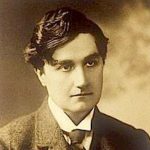 Ralph Vaughan Williams was born into England’s upper class, destined for the nonworking life of a gentleman. But he grew up during a renaissance in English music, spurred by knighted composers Charles Hubert Parry, Charles Villiers Stanford, and George Grove. At London’s Royal College of Music, Vaughan Williams studied composition under Parry, who believed England should have its own distinct music, free of German influence. In an era when many homes had pianofortes and choral societies were widespread across England, the music of the German masters ruled. Vaughan Williams and his friend Gustav Holst dedicated themselves to creating English-defined music, reviewing each other’s compositions with honesty and vision for 40 years.
Ralph Vaughan Williams was born into England’s upper class, destined for the nonworking life of a gentleman. But he grew up during a renaissance in English music, spurred by knighted composers Charles Hubert Parry, Charles Villiers Stanford, and George Grove. At London’s Royal College of Music, Vaughan Williams studied composition under Parry, who believed England should have its own distinct music, free of German influence. In an era when many homes had pianofortes and choral societies were widespread across England, the music of the German masters ruled. Vaughan Williams and his friend Gustav Holst dedicated themselves to creating English-defined music, reviewing each other’s compositions with honesty and vision for 40 years.
His cantata Dona Nobis Pacem, premiered in 1936, opens with a heartrending cry expressing both the composer’s and the public’s anguish over the worsening political situation in Europe, which would lead again to war. Vaughan Williams devoted the years of World War II to helping refugees find shelter and work, providing food by planting huge vegetable gardens and keeping chickens, and helping to stage free lunchtime concerts.
The whole work is welded together by the composer’s sense of urgency; his ‘main inspiration is drawn not from the soil of England, but from the whole world going mad around him’. The music for the words from Micah (‘nation shall not lift up a sword against nation, neither shall they learn war any more …’), and thereafter, becomes more optimistic, here the music returns to a state of hesitant prayer sung ppp by the chorus and solo soprano, a prayer that at the time was not to be granted.
David Murray (piano) and Christopher Murray (cello)
7.30 p.m. in Sunderland Minster. Tickets £10 – accompanied children free – available from choir members or at the door or go to the link on www.bishopwearmouth.co.uk
This father and son duo do not need much introduction. David is Bishopwearmouth Choral Society Musical Director and one of the North East’s best known pianists. His son, Christopher, is a member of the dynamic and charismatic Heath Quartet – winners of many prestigious awards.
The programme will include :
Couperin : Pieces en Concert
Prelude: Sicilienne: La Tromba: Plainte: Air de Diable
Bach: Sonata in G major BWV 1027
Adagio: Allegro ma non tanto: Andante: Allegro moderato
Prokofiev: Sonata Op. 119
Andante Grave – Moderato Animato: Moderato: Allegro ma non troppo
This will be an evening of great variety and outstanding quality.
As part of the Tall Ships visit to Sunderland, Bishopwearmouth Choral Society will be performing on Thursday July 12th 2018 between 1.30 and 2.15 p.m. in Zone B on the Town Moor, close to the Docks (Zone A) and the river where the ships will be docked.
Please see general publicity on the Tall Ships Visit website for accessibility and Park & Ride arrangements.
A Saturday morning event in Fulwell Methodist Church from 10.00 a.m. till 12.00 midday.
Why not join the Society in a social event which comes with a raffle and stalls, while enjoying the tea/coffee, scones and a chat
Our thanks to Margaret Fenn for allowing the publication of this crit of our concert on Saturday June 23rd 2018, which was prepared for publication in the Sunderland Echo :
Sitting in a well filled Sunderland Minster on Saturday night, there was a palpable atmosphere of eager anticipation, coming both from the audience and performers. They were awaiting the arrival on stage of David Murray, the conductor, arranger and inspiration for this sparkling occasion entitled ‘The Great American Songbook’. He duly arrived and so it began with the Carpenters Sequence, a medley of their classic hits.
From the very first introductory falling phrase of ‘Long Ago’ the audience was mesmerized by the nostalgic yet sweet and expressive playing of the strings and the unforced vocal tone of the choir. The perfect ensemble of the choir, the well balanced inner parts cushioning the soaring soprano lines, and the rich tone of the male voices was like listening to a masterclass in choral part singing, all beautifully directed by David Murray, whose magical arrangements of those well- loved songs delighted us all. Tenors basses and altos were allowed to shine as well as sopranos, and this was especially effective in ‘ We’ve only just begun’: the nimble fingers of pianist Eileen Bown lifted the mood completely in ‘Sing’ and ‘Top of the World’.
Ben Laxton was the soloist for the evening. A young and very talented baritone, he presented a set of 3 Cole Porter Songs, accompanied by David. He entertained and impressed with his vocal colours and communicative powers: he was suave and cynical in ‘Just one of those things’, intimate and infused with longing in ‘Night and Day’ and ‘I get a kick out of you’ was delivered with humour and a well judged lightness.
The choir ended the first half with a Jerome Kern Medley, the richer writing here displaying their superb balance, dynamic range and keen ensemble. A lovely solo from violinist Martin Hughes evinced an almost seductive response from the choir, as they hung on every gesture of the conductor. The beguiling piano and bass in ‘Can’t help Lovin’ that Man’ then led into an animated and rhythmic’ Start all over again’ which finished the sequence with a brilliantly witty coda.
The second half started with A Gershwin Selection. The subtle inflections of ‘ The Man I love’ were aided by the chromatic twists of the inner parts, and this led into ‘Fascinatin’ Rhythm’ which was delivered with great gusto. ‘They Can’t take that way from me’ led into a humorously confrontational ‘Let’s call the whole thing off’.
Ben Laxton presented a lovely mix of Rodgers and Hammerstein (Some enchanted evening), Jerry Herman (I won’t send Roses) and Leonard Bernstein (Something’s Comin’) showing his remarkable ease in this range of styles from three great American musicals of the twentieth century.
The last set of songs from the choir was taken from the David Murray Songbook, now becoming popular with choirs across the region. This set presented contrasting styles and themes, from the lyricism of ‘She’s Leaving Home’ to the emotional heart of the programme with ‘You’ve got a Friend’ and ‘Bridge over Troubled Water’. The singing was tender, occasionally passionate, always exquisite. Ben joined them for the final verse of ‘Bridge’ with ‘Sail on Silver bird’.
There were damp eyes in both audience and choir as this reached its spectacular conclusion. A wonderful concert of tremendous music given by a beautifully disciplined choir, superbly accompanied by Eileen Bown and a fabulous string quintet. Well done David Murray and Bishopwearmouth Choral Society!
Margaret Fenn